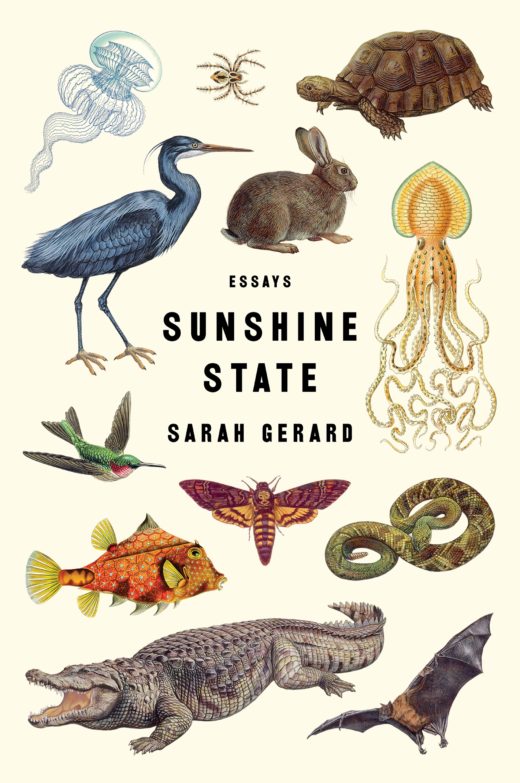- Betty Tompkins: Sex World/WOMEN Words, Phrases, and Stories

- MIRROR STAGES: Brookhart Jonquil in Conversation
THE DARK BEHIND THE SUN: Sarah Gerard’s Sunshine State
Christopher R. Alonso

Sarah Gerard’s second book is a blending of personal essay, deeply researched journalism, and sudden, gutting truths. In the title essay, Gerard writes of a green-cheeked conure she and her husband adopted: “She chewed everything… She sought out our wounds and pulled at them, then groomed open the flesh even wider. She had a taste for blood.” This anecdote serves as a metaphor for Florida. Using the state as a means to write about themes like identity, intimacy, and family, Gerard weaves a beautifully complex book that tackles some of the country’s most urgent issues.
“BFF,” the first essay in the collection, describes an intimate and destructive relationship with a former best friend. Told in the second person, Gerard’s language displays her incredible empathy, and ability to move between the personal and interpersonal. Gerard’s relationship with her friend sets the dynamic shift between the introspective, memoirist portions of her essays and those encompassing people and forces outside herself. In “Mother-Father-God,” Gerard chronicles the religious life her parents led while simultaneously reporting on the history of their former Christian Science community. Alternating between these two histories, Gerard opens one of the central themes that binds the collection together: in one phone call with her mother, Gerard asks how she defines her beliefs, a question that mirrors the changes her parents and the Christian Scientists went through while discovering and defining inner parts of themselves. Her mother, self-described “church homeless,” responds, “We’re all struggling to find some meaning.”
Her mother’s response is part of the compassionate thread woven through each essay even before we decipher the other important ideas Gerard has hidden in the folds. In “Going Diamond,” we are introduced to the infamous DeVos family, and, given the current political climate, many readers will be interested to learn about the family our Secretary of Education married into. Gerard reveals the history of the family’s company, Amway, with the deft precision of an investigative journalist, again alternating between deep inquiry into the company’s business history and a personal narrative of her and her husband’s house hunting in an affluent neighborhood on Florida’s Gulf Coast, delivering a haunting portrayal of economic division—a theme which echoes throughout the collection. Here, Gerard uses Florida as a microcosm of larger national issues, juxtaposing the struggles of Amway workers with the nonchalance of realtors to homes for the wealthy.
Though Gerard is meticulous in her research, as her expansive bibliography shows, she is at her most powerful in her more personal essays. It is through these portions that we see her honesty and empathy even when it feels undeserved for those in her life. In “Records,” Gerard recounts her high school years experimenting with drugs and worrying about college. She deals with finicky relationships, artistic desires, and the trauma of surviving sexual assault at the hands of a boyfriend. Years later, they meet again in New York. He’s a tattoo artist. She wants to get an old tattoo covered up. Her husband is with her, and she has not told him what happened that one night years ago. As her new tattoo heals, Gerard says, “Eventually, it smooths over, becomes integrated.” This is how our experiences shape us, becoming part of our lives. These things die yet still live.
One of her shorter essays, “Rabbit,” is perhaps her most powerful. Gerard begins with the story of a stuffed rabbit doll her grandmother gave her. She writes of her relationship with her grandparents through stories of Thanksgiving dinners and intimate moments during her grandfather’s worsening cancer. Then, her grandmother is forced into an assisted living facility, and Gerard recounts the first Thanksgiving dinner without her grandfather in Florida instead of Ohio. She remembers the stuffed rabbit she still has, “out of sight, not forgotten.”
Gerard publicizes the private and privatizes the public. Though complex and intricate, her exceptional writing cuts with a surgeon’s care. Ultimately, this book facilitates a better understanding of ourselves through digging up the difficult truths we’d more likely attempt to hide away in the sand.
Christopher R. Alonso was born in Miami to a family of Cuban exiles. He is a current MFA student at the NEOMFA program at Youngstown State University and the fiction editor for Jenny Magazine.








